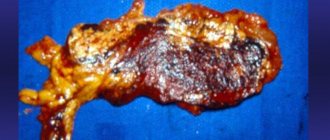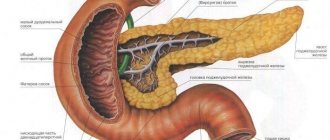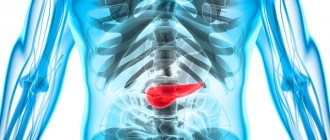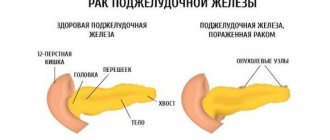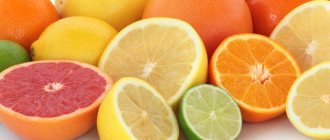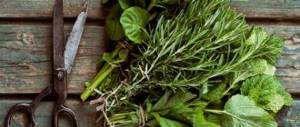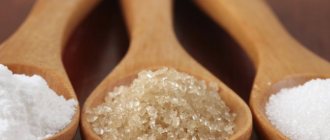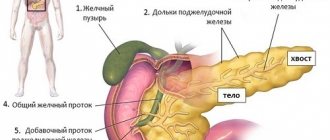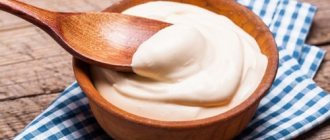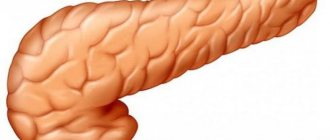Causes of the disease and mechanism of development
Pancreatitis is an inflammation of the pancreas tissue, which is accompanied by constipation, regardless of its course.
- In the acute form, gland enzymes are prematurely activated and destroy organ cells, releasing toxins. In this case, constipation develops with paralytic intestinal obstruction, due to intoxication of the body.
- In chronic pancreatitis, alternating constipation and diarrhea are observed. Constipation is associated with the replacement of functional enzyme-containing cells with rough connective tissue (similar to scarring of skin wounds with deep injuries). In this case, there are not enough enzymes to break down food, so undigested food accumulates in the intestinal lumen.
The chronic form of inflammation of the pancreas is often manifested by constipation as a complication of diabetes mellitus. This is due to the replacement of hormonal cells by the same fibrous tissue, which leads to insulin resistance. Insulin, in addition to the utilization of glucose, increases intestinal motility, that is, in its absence, the intestines do not function sufficiently, which leads to constipation.
Symptoms of constipation
Obstipation and pancreatitis are interrelated concepts, because with gland disease, the absence of stool is often observed. With symptoms of constipation, the patient will encounter the following manifestations:
- increased gas production, bloating and problems with passing gas;
- pain in the abdominal area;
- absolute absence of stool;
- poor appetite;
- mild jaundice;
- nausea.
nausea
If constipation torments the patient for a long period of time, excrement accumulates in the intestines and a putrefactive process develops, which leads to poisoning of the body. This provokes:
- headache;
- rashes;
- chronic fatigue.
Before going to the bathroom, the patient develops sudden pain in the abdominal area, and during bowel movements, due to stagnant feces and the formation of gases, cracks appear in the anus.
When constipation develops during the acute stage of pancreatitis, you should immediately consult a doctor, since accumulated excrement can provoke intussusception.
Problems with defecation occur with pancreatic disease and other gastrointestinal pathologies. Obstipations in pancreatitis and cholecystitis should not be left to chance, since complications will develop in the absence of therapy.
seeing a doctor
Features of clinical manifestations
Constipation usually quickly gives way to diarrhea. But if there is no bowel movement for a week or more, a person develops other symptoms:
- flatulence;
- pain;
- nausea;
- vomiting, which does not bring relief;
- lack of appetite;
- drowsiness and fatigue.
If nothing is done, obstructive intestinal obstruction may develop with the formation of fecal stones. Also, frequent or prolonged constipation disrupts the normal microflora and contributes to the proliferation of intestinal infections.
Treatment and prevention
Since constipation is not an independent disease, it is the cause that needs to be treated, that is, pancreatitis. The first thing you need to do is start eating right. The diet for pancreatitis and constipation has its own characteristics.
- The diet should contain a sufficient amount of water in the form of infusions, compotes, medicinal teas and clean water. Coffee, strong tea, carbonated drinks and alcohol should be excluded.
- All products must be cooked in water, steam, in a slow cooker and some in the oven. Under no circumstances should you eat fried, fatty or fast food.
- Dishes should contain a minimum amount of salt without any seasonings. It is also not advisable to overindulge in sweets, because glucose provokes the development of diabetes mellitus against the background of an already damaged pancreas.
- Food should be varied, always fresh, and nutritious enough.
- Food intake should be timely, small portions 5-6 times a day.
- In the morning, food should be more high-calorie, and in the evening, on the contrary, light.
Constipation during exacerbation of pancreatitis requires a completely different treatment strategy. The first day you need to adhere to the rule: “Hunger, cold and peace.” This means that it is better to refuse food, only drink. Apply a cold heating pad to the sore spot and leave the patient alone. When a person feels better, you can start eating broths and porridges with water in limited quantities.
What is pancreatitis
The pancreas is one of the important organs of the digestive system, which is responsible for the release of the hormone insulin, a necessary component of all metabolic processes in the body. In addition, it performs an exogenous function and produces enzymes that promote the digestion of food in the gastrointestinal tract.
Pancreatitis is a common cause of constipation
With dysfunction and inflammation of the gland, the process of absorption and breakdown of nutrients is disrupted.
The main causes of pancreatitis:
- Poor nutrition.
- Alcohol consumption.
- Chronic infectious processes.
- Stress and overwork.
With this disease, the normal functioning of the intestines is disrupted, which leads to diarrhea or constipation. Most often, the problem of constipation occurs in the acute period of the disease. Normally, pancreatic cells produce various enzymes that are necessary for the digestion of proteins, fats and complex carbohydrates.
During inflammation, the organ does not release these substances in the required quantities , as a result, the physiological process of digesting food is disrupted, which leads to problems with bowel movements.
Drug therapy
The prescription of medications depends on the course, degree of the underlying disease and secondary manifestations. The dose, course and frequency of administration also depend on these factors, as well as on the individual characteristics of the person and concomitant diseases.
- Preparations containing enzymes (Creon, Pancreatin). They replace natural enzymes that are not produced during chronic pancreatic damage.
- Antispasmodics (Drotaverine, Papaverine). These drugs are needed in cases of pain. It is not advisable to take conventional analgesics.
- Prokinetics (Motilium, Metaclopramide). They normalize intestinal motility to prevent constipation.
- Laxatives (Dufalac, Normaze). In cases of prolonged absence of defecation.
Many people with constipation practice the use of cleansing enemas. This is not a very successful method, because in some cases it is unnecessary, and also very unpleasant and stressful for the patient.
Causes and ways to prevent constipation in chronic pancreatitis
In chronic patients, the main cause is dietary fiber deficiency, which reduces intestinal motility. The matter is aggravated when the patient leads a sedentary lifestyle, has primary (due to inflammation) or secondary (provoked by insufficient function of the inflamed gland) diabetes mellitus or other diseases of the gastrointestinal tract. Symptoms often look something like this:
- It is difficult for the patient to have a bowel movement, he strains, but this does not give any result. Sometimes a hard fecal plug provokes pain in the anus when straining;
- There is no stool for more than three days;
- The patient's appetite decreases and mild fatigue occurs;
- Nausea occurs, the stomach swells;
- When you urge to go to the toilet, a pain syndrome of a girdling nature may occur;
- The skin acquires a yellowish color due to autointoxication by food digestion products;
- The stool contains bloody or mucous inclusions;
- The patient complains of muscle weakness.
In the absence of timely measures taken to eliminate this condition, self-poisoning with decay products leads to disruption of the excretory system and liver, which is dangerous for the development of failure of these organs.
Painkiller
To relieve annoying pain, the following medications are recommended:
- Non-steroidal anti-inflammatory drugs (beyond exacerbation, provided there are no acute inflammatory processes in the stomach and intestines);
- Antispasmodics – relax the muscles of the digestive tract.
Sport
Physical exercise helps stimulate peristalsis and speedy excretion of feces. A wide range of types of exercise is suitable - aerobics, walking, running, dancing. It is recommended to start the morning with a set of gymnastic exercises. However, during the acute period, stress on the abdominal muscles should be avoided and, if your health allows, limit yourself to walking or cycling.
Proper nutrition
Patients suffering from constipation due to a diseased pancreas are advised to consume such types of food as boiled cereals, unsweetened cheesecakes and cottage cheese casseroles, omelettes, boiled poultry and lean fish. In the first weeks after an exacerbation, you should strictly avoid plant fiber products, however, after several months they should be included in the diet in a heat-treated form. Smoked meats, canned food, soda and spicy foods are prohibited. Mushrooms and cabbage are also contraindicated for pancreatitis.
Control of nutrition and physical activity reduce the likelihood of developing an unpleasant disease, however, when it manifests, it is necessary to take appropriate medical care measures for the situation and the patient’s condition.
Constipation after pancreatitis
After suffering inflammation, it is very difficult to achieve complete recovery. Often, remission simply occurs with a sluggish course. If, after the signs of pancreatitis disappear, constipation remains, this may indicate two reasons. The first is incorrectly selected treatment tactics, diet violations or untimely medication. The second is a complication in the form of diabetes. Only a specialist can confirm or deny this.
To summarize, it must be said that the main cause of constipation in pancreatitis is poor diet. A person's health depends on his ability to help himself. With this disease, it is easy to save, you just need to make a little effort.
Constipation with pancreatitis: what to do
Treatment of constipation with pancreatitis requires an integrated approach. First, you need to undergo an examination at the clinic, passing all the necessary tests to establish the main cause of the violation of regular bowel movements. If this is associated with pancreatitis, then a set of measures aimed at eliminating the disease is prescribed.
Mostly treatment for constipation includes diet, sports, traditional medicine recipes, and medications.
Medications
Constipation due to pancreatitis is recommended to be treated with safe medications containing substances that are not absorbed in the body. You should select medications that do not affect the functioning of the pancreas.
So, the following laxatives for pancreatitis can be distinguished:
- Based on lactulose, for example, Duphalac. The drug simultaneously accelerates the process of production of digestive enzymes and quickly removes toxins from the body.
- Drugs that stimulate the intestinal muscles cause them to quickly remove feces from the system. Bisacodyl belongs to this group.
- Local agents, for example, rectal suppositories with glycerin. They are not absorbed into the circulatory system and do not affect the functioning of the digestive organs. Suitable for mild types of constipation, when waste products are located directly in the large intestine.
Proper nutrition
If you have chronic inflammation of the pancreas, you should definitely eat at the same hours, using safe foods and healthy cooking methods.
So, in the daily menu for pancreatitis you can include sweet fruits, steamed or baked vegetable dishes, cereal porridges, fermented milk drinks and dietary meat.
Лучшие в городе проверенные феи Нальчика, сочные и сладкие, они такие игривые и чуткие, что ты не устоишь перед ними. Выбери девушку сейчас. Ласковые кошечки с rednalchik.ru встречаются только по взаимной симпатии, проверенные феи Нальчика, стоящее наслаждение. Проведя время с проститутками, вы захотите продолжения снова и снова.
